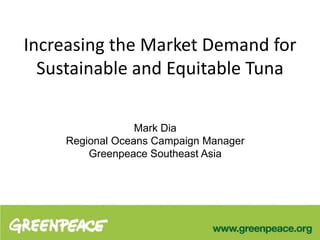Greenpeace presentation coastal tuna forum jakarta2013.v2 english
- 1. Increasing the Market Demand for Sustainable and Equitable Tuna Mark Dia Regional Oceans Campaign Manager Greenpeace Southeast Asia
- 2. In this presentation ŌĆó Overview of Greenpeace ŌĆó Our tuna campaign ŌĆó Our markets work globally ŌĆó Focus on tuna ŌĆó Key achievements and future trends ŌĆó Recommendations
- 3. Overview of Greenpeace in Indonesia ŌĆó Established in 2006 ŌĆó Work on Forest, Climate & Energy , Toxics ŌĆó Oceans in 2013 ŌĆó 50,000 Supporters
- 4. Greenpeace campaign on tuna sustainability ŌĆó A priority in our global oceans campaign ŌĆó Focus in the Pacific and Indian oceans ŌĆó Engagement with key developed fishing powers and key coastal states ŌĆó Policy development and capacity building ŌĆó Markets work for sustainable and equitable options and to change corporate behavior
- 5. Greenpeace markets work ŌĆó Focus on retailers and their sustainability policy ŌĆó Ranking of retailers based on this policy, leads to competition and relatively rapid improvements ŌĆó Has led to a large demand for sustainable, traceable seafood products word-wide ŌĆó Not just environmental but also social criteria, hence not a trade barrier but an opportunity for coastal states/fisheries
- 6. Markets work tuna focus ŌĆó Started in 2008 with a sustainability ranking of the UK tuna brands ŌĆó 2nd biggest market in the world ŌĆó Global Retailers: Tesco, Asda
- 7. Markets work tuna focus ŌĆó KEY DEMANDS ŌĆó Drop the use of FADs in purse seine ŌĆó Prefer pole and line, handline and troll caught tuna ŌĆó Stop sourcing from depleted stocks ŌĆó Ensure legality and traceability (beyond dolphin safe)
- 8. Tuna markets work going global ŌĆó Several rankings now in UK, Italy, Australia, Austria, Netherlands, Canada, ŌĆó Also tuna focus in US and NZ ŌĆó New tuna focus in markets work in Japan, Spain and France as of 2013 ŌĆó Other East Asia markets coming up including LL brands and sashimi
- 9. Promotion of pole and line ŌĆó Have focused messaging on pole and line as the best option for markets on canned tuna since 2008 ŌĆó Launched a report in 2008 ŌĆó Pre-order petition to encourage (re)development of this industry ŌĆó 70000 tins pre-ordered in 2009 ŌĆó Aim a reduction in industrial purse seine fishing and replacement by P&L
- 10. Key achievements ŌĆó Entire UK and Australia tinned tuna markets will be FAD free PS or pole and line/hand line by 2016
- 11. UK now world leaders in sustainable tinned tuna commitments
- 12. UK now world leaders in sustainable tinned tuna commitments
- 13. Commitments ŌĆó Tesco ’ā░100% P&L 2012 ŌĆó Co-op ’ā░100% P&L 2013 ŌĆó Morrisons ’ā░ 100% FAD-free/P&L 2013 ŌĆó Asda ’ā░100% FAD-free/P&L 2014 ŌĆó Princes ’ā░100% FAD-free/P&L 2014 ŌĆó John West ’ā░100% FAD-free/P&L 2016 ’ā░FAD-caught tinned tuna unacceptable in UK market
- 14. Key achievements ŌĆó Entire UK and Australia tinned tuna markets will be FAD free PS or pole and line/hand line by 2016 ŌĆó Many other markets making major commitments NZ, Italy, US, Canada ŌĆó Expect more sweeping commitments from especially north American markets and the retailers there.
- 15. Focus on fresh tuna and yellowfin ŌĆó Increased focus on Japan/fresh tuna (and negative impacts of long line fishing) ŌĆó Will need COC and sustainability improvements in the handline/longline sectors also ŌĆó Needs careful development as sustainability issues with YF stocks on every ocean and requires policy work by governments to ensure RFMOs manage species sustainably and implement nationally
- 16. Other next steps planned ŌĆó Launching a report on transforming tuna fisheries ŌĆó Highlight case studies on government policies to support domestic industry ŌĆó Business model proposal for P&L industry ŌĆó Working on investors version and getting feedback on the model
- 17. Coastal state solidarity & policy change ŌĆó Looking at industry transformation across the region - Indian Ocean, Pacific and South East Asia ŌĆó Joining forces for policy reform on fishing overcapacity, MCS and setting sustainable fishing limits and allocation.
- 18. Greenpeace seeks a substantial transformation from fisheries production dominated by large- scale, capital-intensive, socially and economically unjust and environmentally destructive methods to smaller scale, community-based, labour-intensive fisheries using ecologically responsible, selective fishing technology and environmentally sound practices. Greenpeace principles for low-impact ecologically-responsible fisheries



















